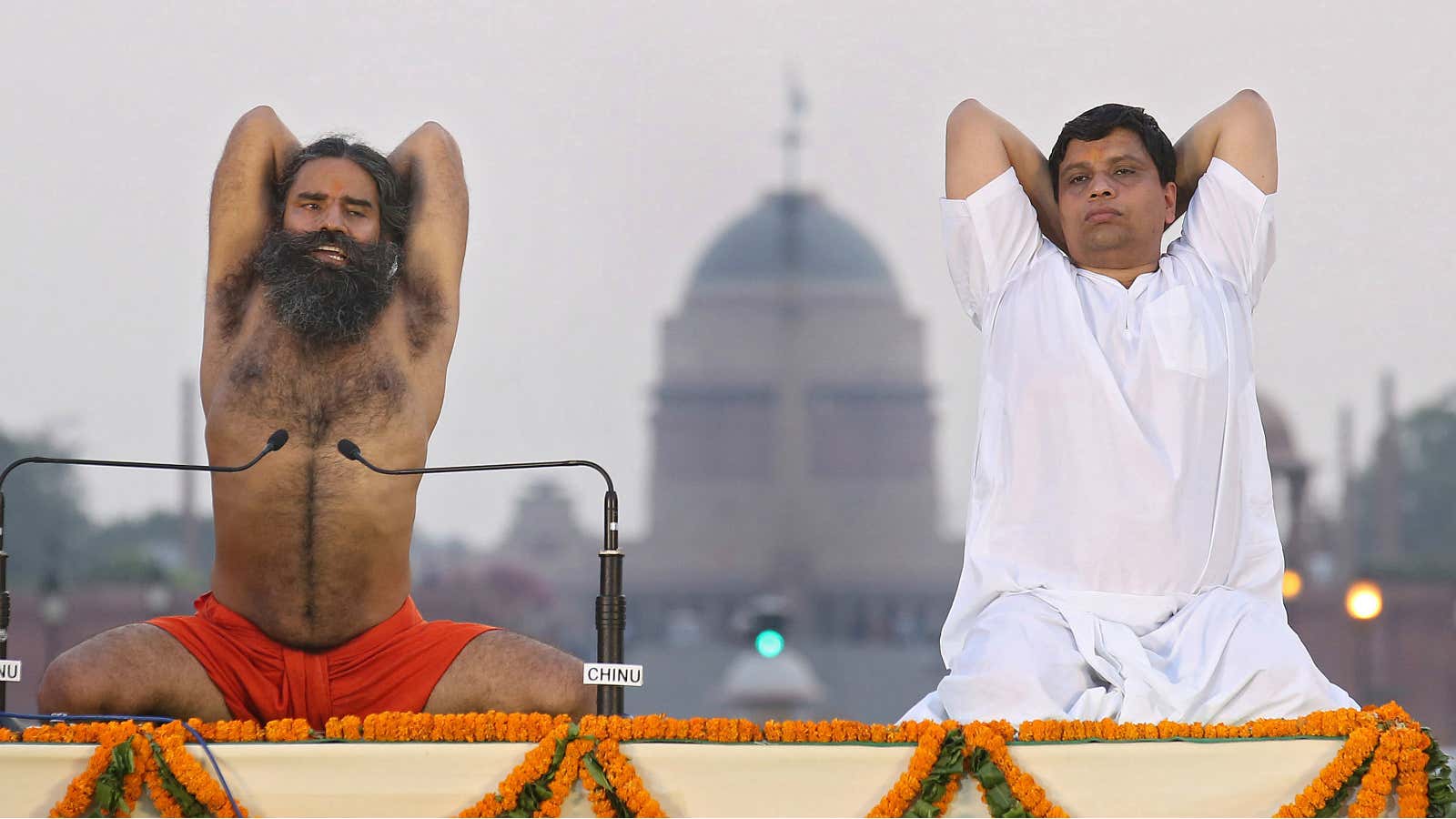Acharya Balkrishna’s Twitter tips on how to use natural, homemade remedies to keep your gums from bleeding or joints from aching have earned him over 31,000 followers since 2011. But it’s not just his mastery over Ayurveda that has catapulted him into India’s billionaire club. The 44-year-old also has some serious business chops.
On Sept. 22, Balkrishna, chief executive officer at consumer goods company Patanjali Ayurved made his debut on Forbes’ 2016 list of the 100 richest people in the country at number 48. His estimated net worth: $2.5 billion.
An ayurvedic scholar and a close aide of Patanjali founder Ramdev, he now joins the echelons of established billionaires such as 59-year-old Mukesh Ambani, promoter of one of India’s largest conglomerates, Reliance Industries, and technology tycoon Azim Premji. Balkrishna’s entry into the Forbes list comes days after a Chinese magazine, Hurun, featured him in a similar set of rankings.
Much of Balkrishna’s fortune comes from his massive 97% stake in Patanjali, which he co-founded with Ramdev. At Rs5,000 crore in turnover, the ayurvedic behemoth is giving India’s biggest fast-moving consumer goods companies a run for their money. Although in past interviews the CEO has claimed that he doesn’t draw a real salary, Balkrishna is the man in charge of executing the company’s day-to-day operations, including expansion into new businesses such as setting up of food parks and educational institutes. He also oversees 5,000 Patanjali clinics, the Patanjali University, and a yoga and ayurveda research institute.
And, Balkrishna’s climb to the top was a very different journey from those of the heirs and foreign-educated business executives who make up India’s elite.
Scholar to businessman
Born as Balkrishna Suvedi in 1972 to parents who later migrated from Nepal to India, his early education was at a gurukul (a type of school rooted in the ancient vedic system of education) in Kalwa, Haryana, under the tutelage of Acharya Shri Baldevji. Baldevji was a member of the Arya Samaj, a Hindu religious sect.
This is where he met Ramdev for the first time. After Balkrishna received a postgraduate degree from Sampurnanand Sanskrit Vishwavidyalaya, a university dedicated to the teaching of Sanskrit and ancient Indian philosophy, in Varanasi, the two later moved to Hardiwar in Uttarakhand. There, they opened Divya Pharmacy and began selling ayurvedic medicines and herbs for common ailments.
In 2006, the two got together to set up Patanjali, a consumer goods company. The fortunes of the two yogis have since changed.
In the last decade, the company has basically flooded the market with some 400 SKU’s, or stock-keeping units, such as noodles, flour, soaps, shampoos, creams, juices, biscuits, face-washes, and more under the Patanjali brand, competing with almost every consumer goods company in the country. This was accompanied by investments in food parks to grow more herbs and plants and building a large retail network to sell goods. There are now over 10,000 dedicated Patanjali stores—chikitsalayas and kendras—across India. By 2020, the company is expected to generate Rs20,000 crore in turnover.
But Balkrishna’s time as an entrepreneur has been riddled with allegations of money laundering and acquiring fake degrees. In 2011, the CBI booked him in a case of cheating, alleging that his degree from Sampurnanand Sanskrit Vishwavidyalaya was fake. In 2012, the Enforcement Directorate, a law enforcement agency, alleged that he laundered funds to foreign locations using a fake passport. Both cases have since been closed.
His website identifies him as a “scholar of Ayurveda, Sanskrit language, and the Vedas” who has a “deep understanding of Sāṅkhya Yoga, Ayurveda, Sanskrit language, Pāṇini’s Aṣṭādhyāyī, Vedas, Upaniṣads and Indian philosophy.”
In an interview with the Times of India newspaper in April, he revealed his daily schedule, one that matches most other globe-trotting CEOs.
“I work daily from 7 am to 10 pm. While a normal person would work for 8 hours a day, I work for 15 hours, through the week. I am doing the job of five people.”
Clearly, it’s paying off.
